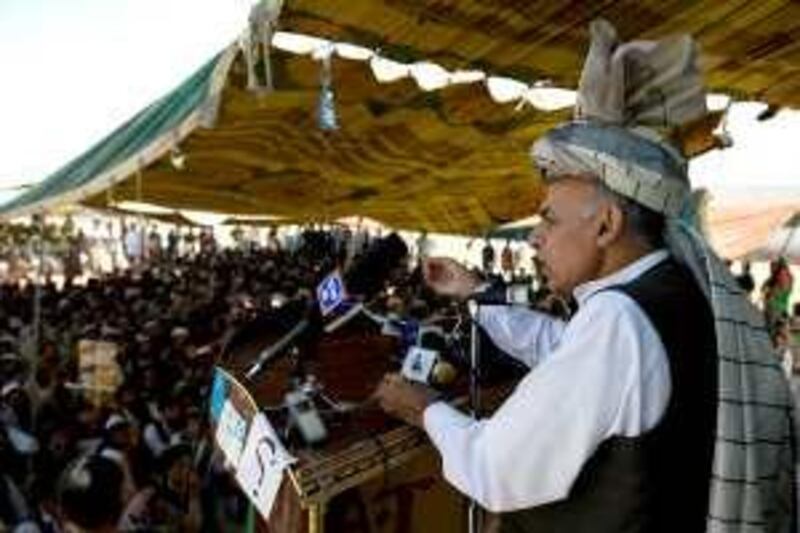GARDEZ, PAKTIA PROVINCE // Fraud and not the Taliban-led insurgency is the biggest threat to Afghanistan's upcoming presidential election, one of the main candidates has warned. While attention is focused on the bloodshed sweeping across the country with just over a week to go before polling day, Ashraf Ghani Ahmadzai fears an even more serious problem is going unchecked. "The election is neither going to be free nor fair. This is the fifth most corrupt government on earth, it has done everything to prevent a free and fair election," he said. Voting is due to take place on August 20 and President Hamid Karzai is thought to have only two real challengers. Mr Ahmadzai, his former finance minister, is one of them. The other is Abdullah Abdullah, a prominent member of the Mujahideen during the 1980s and 1990s and later part of the US-backed Northern Alliance movement. Both opposition campaigns have accused the incumbent's team of planning to rig the ballot by obtaining registration cards for non-existent female voters in a number of provinces. This has given rise to concerns about what will happen when the results are announced. Speaking soon after he held a rally in Paktia, Mr Ahmadzai said the most important issue now is how to get "a legitimate outcome out of a very flawed process". "The person who is suffering worst from electoral fraud is Mr Karzai. Should he win nobody in this country is going to believe that was legitimate. So actually by indulging in electoral fraud he has deprived himself of the most precious commodity that the politician needs: people's trust," he said. Last Friday the International Council on Security and Development published a report outlining some potentially grim scenarios for Afghanistan in the weeks ahead, claiming a definitive victory for the incumbent might make him the target of anger and suspicion. If a run-off is required because no one initially wins more than 50 per cent of the vote, tension may also boil over in the build-up to the second round. Either way, there is a real risk of clashes between the country's two largest ethnic groups: the Pashtuns and Tajiks. "The chances for civil unrest are high," the report warned. Mr Ahmadzai's campaign is being advised by James Carville, an American strategist who helped Bill Clinton reach the White House in 1992. And although he is considered third favourite behind Mr Abdullah, his reaction to the result could prove crucial to determining what ultimately happens here. "What I will do is by civic action, but not by the threat of force. The threat of force is to be ruled out. We cannot ask our people under any circumstances to resort to violence," he said. "The other candidates must respond in the same way. This is not a question of choice. Any candidate that violates the sacred duty which is the security of the ordinary Afghan - men and women - is going to be held responsible by the nation," he said. Grant Kippen, chairman of the Electoral Complaints Commission, insisted all allegations of fraud would be looked at if "specific evidence" is provided. He pointed out that candidates are allowed to have their own agents monitoring the polling stations and said voters themselves can "play a critical role" if they notice anything suspicious. Afghanistan's first-ever presidential election was held in 2004, when Mr Karzai won easily with just over 55 per cent. Security has deteriorated since then, and many people have grown disillusioned with the government and the international community that supports it. On the key issue of the occupation, there is little to divide the three main candidates as they all back the continued presence of Nato and US soldiers here. In theory at least, they also all favour engaging in dialogue with the Taliban and other Afghan insurgent groups. Mr Ahmadzai, a Pashtun and former World Bank executive, claims to have rejected overtures to join Mr Karzai's ticket. His visit to the south-eastern province of Paktia included a meeting with the chief of police and a rally attended by hundreds of locals. "I don't want Paktiawals to go to the Gulf and work as labourers. I want Paktiawals to go to the Gulf and become doctors, engineers and directors of organisations," he told the crowd. @Email:csands@thenational.ae
'Fraud is biggest threat to elections'
Contender warns that the main concern in the lead-up to polling day is not Taliban violence but whether the vote will be free and fair.

More from the national





